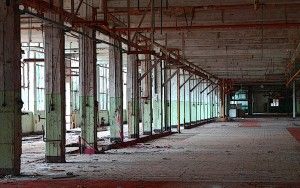At SURF’s recent seminar on Bridging Culture and Regeneration, Prof Greg Lloyd argued that an increase in creative and culture-led approaches to regeneration may realistically have little impact in struggling Scottish communities, given the magnitude of degenerative forces currently exerted on them.
SURF subsequently invited Prof Lloyd to elaborate on his thoughts. Here, he asks: is degeneration now more important than regeneration?
Front and centre
Accounts of urban regeneration tend to focus on exploring and understanding the design of interventions to meet the needs of disadvantaged communities and localities. These are articulated in economic, social or physical terms.

The closure of factories often provides a rationale for regeneration investments
Thus, the collapse of a major industrial plant in an inner city neighbourhood may occasion measures to promote inward investment, local business support and the refurbishment of redundant spaces.
The initial introduction of enterprise zones, for example, was intended to increase the supply of appropriate business space in designated areas of distress. In other contexts – and these approaches have not been mutually exclusive, of course – the focus has fallen on community development initiatives with an emphasis on providing training measures for those affected by sharp economic change.
Regeneration has also matured through phases of attention. Various accounts point to the emphasis at particular times on community activism, property refurbishment and provision, a focus on heritage and environmental greening.
A common thread tends to be on the need to enhance economic, industrial and business investment and development. Today, and very much part of the overall experimentation under the different devolved arrangements, there appears to be a move to secure the better integration of regeneration with other measures – policy coupling. There is also the tendency to the mainstreaming of regeneration in cognate policy areas – including health and education.
In effect, regeneration is now very much centre stage of public policy domains.
Surpassed by degenerative forces
 But does this miss the point? Regeneration is a response to the localised effects of degeneration – which may be economic, industrial, social or physical in nature.
But does this miss the point? Regeneration is a response to the localised effects of degeneration – which may be economic, industrial, social or physical in nature.
Following an embedded notion of the neoclassical market failure argument, regeneration is perceived as the appropriate intervention to correct these specific circumstances. It implies that regeneration can put right the breakdown in economic, social or physical conditions and subsequently returning to some sort of stability.
It suggests that degeneration can be managed – not necessarily in absolute terms but certainly with respect to individual interventions in particular places at various times. The assumption appears to be that regeneration can catch up with the processes of degenerative industrial and economic change. Yet what happens if degeneration outstrips regeneration?
The question is a valid one as most experiential learning around regeneration took place against a general milieu of economic growth, of an availability of resources and capacities, of an ideology sympathetic to redistribution, and of expected returns to regeneration and locational wellbeing.
In other words, there was an assumption that regeneration could work. It could address the localised downturn – and not necessarily in turning back the clock – it could ameliorate the worst impacts. In a number of instances regeneration has achieved positive effects and facilitated some alternative economic activity, and yet in others the complexity of economic and industrial restructuring has proved to be more intractable.
Political & geographic challenges
Now, of course, the opposite context is associated with any attempt at regeneration.
There is a marked variability in relative economic performance – London versus the rest, north versus south, city versus county, town versus rural, inner city versus suburbs and so on. This geography of contraction is matched also by the emerging geography of recovery – with an evident core-periphery being asserted in terms of economic and social stability and time.
An ideology of neo-liberalism is now the new normal – bringing with it associated narratives of austerity, authoritarianism and a reliance on libertarian thinking. All these complex factors and influences combine again to foster an even more uneven geography of opportunity – shown in the deeply embedded notion of trickle-down – and a general environment of continuing restructuring, systemic change and degeneration. Here it is also evident that degeneration is affecting sectors, such as construction and retailing, as well as localities and communities.
Moreover, there are over-arching processes of degeneration taking place as a consequence of complacency, denial and neglect – the overall deterioration in infrastructure, the lack of investment in maintaining services and the ever more evident inequalities in society. More and more communities are being affected by a general degradation in living standards, opportunities and support. Degeneration is now a generic feature of the modern world.
 New thinking
New thinking
Degeneration is spreading. The causes of degeneration are now far more complex than perhaps were previously acknowledged.
This suggests that more attention needs to be paid to the structural nature of degeneration, its specific locational and psychological manifestations, its components of change – the knock-on effects on factors which may have been assumed were available for any upturn, stability and recovery.
What can be done? The first is to challenge the embedded notion of cyclical behaviours – a belief that as long as we keep our nerve the business cycle will re-assert itself and we can return to the old “normal”. This has to be replaced with a more robust structural understanding of what the economy really looks like – so as to have a better appreciation of its characteristics – good and bad.

An unsustainable property market is a significant contributor to degeneration
We must also question the old notion of normality and recognise it for what it was – an artificially orchestrated economic and property boom – which was not only unsustainable and proved to be so. Second, we need a structural appreciation of what the economy can produce – and linked to that we need deliberate action. We must reject happenstance – we cannot rely on chance any more – chance that a new technology, patent, energy source will somehow come along. We need joined up action – we need, for example, to integrate all the factors of production from education, skills and training to finance and investment to the appropriate zoning of land.
We should not simply be driven by supply side mantras – there is a more holistic view of the world – as an ecosystem not simply as a sweatshop for available assets. Third, we need to recognise that robust intervention is needed and that can come from top down state entrepreneurial action, to bottom up community initiatives – each appropriate to their specific sense of well-being and resilience. We must reject the dirigiste ‘one size fits all’ mentality and remember that just as economic activity is not even over time or space neither is resilience and adaptation. Once we change the mindset, then regeneration can come into its own again.
Regeneration needs to be rethought so as to reflect the more complex, systemic weaknesses and divisions in different social economies. There is a new focus abroad, which requires a new understanding – which itself needs a new prism of seeing the issues. Conventional measures for regeneration may need recasting as degeneration grown faster and bigger than regeneration.
